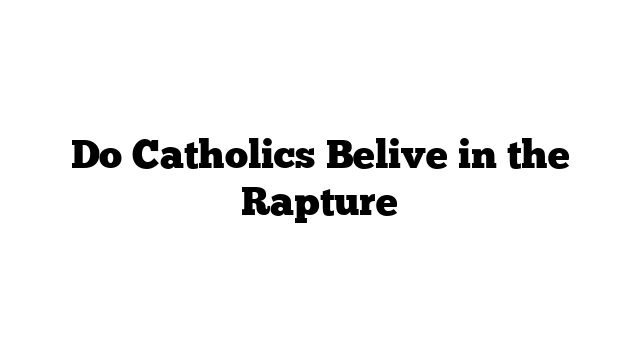Beliefs & Practices
Understanding the Catholic Perspective on the Rapture
Introduction
The concept of the rapture has been a topic of discussion and debate within the Christian community for many years. While it is commonly associated with Protestant beliefs, there may be confusion about what Catholics believe about the rapture. This article aims to provide a comprehensive understanding of the Catholic perspective on this topic.
Clarifying the Rapture
The term “rapture” refers to the belief that Christians will be taken up to heaven at the second coming of Christ, before a period of tribulation on Earth. This belief is based on interpretations of biblical passages, with different denominations having varying perspectives.
Catholic Teaching on the Rapture
Within Catholicism, the belief in the rapture as commonly understood in Protestant theology is not embraced. The Catholic Church does not teach that believers will be secretly whisked away prior to a period of tribulation. Instead, the Catholic Church has a different understanding of the end times and the second coming of Christ.
The Second Coming of Christ
Catholics believe in the second coming of Christ, which will be a visible and triumphant event. At the second coming, both the living and the dead will be judged, and God’s kingdom will be fully established on Earth. This is a time of universal resurrection and final judgment, when all souls will have their ultimate destiny determined.
The Catholic View on Tribulation
Rather than focusing on the idea of a rapture before a period of tribulation, the Catholic Church teaches the importance of perseverance during times of trial and suffering. Catholics believe that through their faith, they can find strength and hope in the midst of difficulties, trusting in God’s plan for salvation.
Biblical Foundations of Catholic Teaching
Catholic teaching on the end times and the second coming of Christ is primarily rooted in the Bible. The Book of Revelation, while often associated with the rapture by some Christians, is interpreted differently within Catholic theology. The emphasis is on the victorious return of Christ and the establishment of God’s kingdom on Earth, rather than a selective event whereby certain believers are taken away.
The Catechism of the Catholic Church
The Catechism of the Catholic Church provides a clear outline of the Catholic understanding of the second coming of Christ. It emphasizes the universal judgment, the resurrection of the dead, and the transformation of the world. The Catechism affirms that Christ will come again “in glory to judge the living and the dead,” bringing about the fulfillment of God’s plan for humanity.
Shared Beliefs with Other Christian Denominations
While there are differences in belief regarding the timing and details of the end times, Catholics share common ground with other Christian denominations on central aspects of the faith. All Christians look forward to the second coming of Christ, the final judgment, and the establishment of God’s eternal kingdom.
Embracing Hope and Faith
The Catholic perspective on the end times encourages believers to approach the future with confidence and hope. Instead of being preoccupied with the timing and specific events, Catholics are encouraged to live out their faith, seeking holiness and spreading the message of love and salvation.
Conclusion
In summary, Catholics do not believe in the rapture as traditionally understood by many Protestant denominations. Rather, the Catholic Church teaches about the second coming of Christ, the universal judgment, and the establishment of God’s kingdom on Earth. The emphasis is on perseverance, hope, and faithfulness in the face of tribulation. Regardless of theological differences on the specifics of the end times, Christians of various denominations can find common ground in their shared belief in the glorious return of Christ and the fulfillment of God’s plan for humanity.

